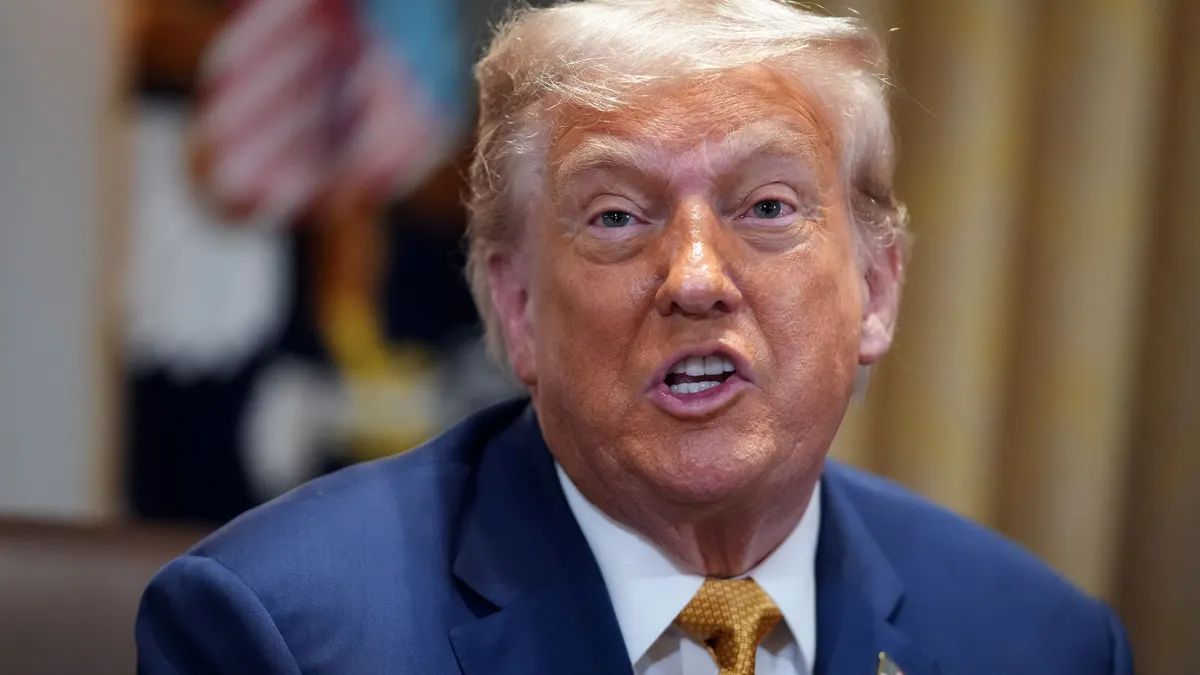The White House on Wednesday released a long-awaited artificial intelligence action plan that called for removing regulations that could hinder innovation in the emerging space, among other steps.
The plan, which stems from a January executive order, states that AI-related federal funding should not be directed toward states with burdensome AI regulations “that waste these funds.” At the same time, the federal government should avoid interfering with states’ rights to pass “prudent laws that are not unduly restrictive to innovation,” according to the document.
“To maintain global leadership in AI, America’s private sector must be unencumbered by bureaucratic red tape,” the White House said.
The announcement comes as AI rules and legislative proposals are rapidly piling up across states, creating a complex regulatory environment for businesses and their finance leaders.
“AI is far too important to smother in bureaucracy at this early stage, whether at the state or Federal level,” the White House plan states.
Earlier this month, during the final stages of the so-called Big Beautiful Bill Act’s passage, the Senate stripped a provision that would have imposed a moratorium on state AI regulation. That action followed a failed effort by Senate Commerce Chairman Ted Cruz, R-Texas, to advance compromise language.
Paul Lekas, head of global public policy at the Software & Information Industry Association, said it’s too early to assess the potential impact of the administration’s call for reducing AI regulatory “red tape” at the state level.
“We don’t have the details of how federal agencies are going to attach strings to AI-related discretionary funding, so we’ll have to take a close look at that,” Lekas said in an interview.
“Short of action by Congress, there are limited things that the executive branch can do to directly incentivize states to change their laws or enforcement priorities,” he added. “What I actually see as most significant in this plan is the way in which it lays out an ecosystem for AI innovation across many domains — almost a whole-of-society effort.”
Trump urges federal standard
Hours after the White House released its plan, President Donald Trump called for a federal AI standard that “supersedes all states.”
“If you are operating under 50 different sets of state laws, the most restrictive state of all will be the one that rules,” the president said at an AI summit in Washington.
Trump’s Jan. 23 executive order called for the development of an AI action plan within 180 days led by David Sacks, a special White House advisor for AI and crypto, among other administration officials.
The plan announced Wednesday identifies over 90 federal policy actions across three pillars — innovation, AI infrastructure, and international diplomacy and security — that the administration plans to take in the coming weeks and months, according to a White House statement.
“To remain the leading economic and military power, the United States must win the AI race,” Sacks said in the statement.
The plan calls on the White House Office of Science and Technology Policy to launch a request for information from the public about current federal regulations that hinder AI innovation and adoption and work with relevant U.S. agencies to take appropriate action.
The White House tapped the Office of Management and Budget to coordinate an effort to “identify, revise, or repeal regulations, rules, memoranda, administrative orders, guidance documents, policy statements, and interagency agreements that unnecessarily hinder AI development or deployment.”
OMB will also work with federal agencies that have AI-related discretionary funding programs to ensure they consider a state’s AI regulatory climate when making funding decisions.
In addition, the Federal Communications Commission will evaluate whether state AI regulations interfere with the agency’s ability to carry out its obligations under the Communications Act. In addition, the plan calls for a review of all Federal Trade Commission investigations commenced under the previous administration to ensure they don’t advance theories of liability that “unduly burden AI innovation.”
Other areas of the plan call for:
- updating federal procurement guidelines to ensure that the government only contracts with “frontier large language model developers who ensure that their systems are objective and free from top-down ideological bias”;
- expediting and modernizing permits for data centers; and
- advocating for international AI governance approaches “that promote innovation, reflect American values, and counter authoritarian influence.”
Mixed reaction
The plan was hailed by industry groups, including the U.S. Chamber of Commerce.
“This forward-looking plan takes steps to accelerate innovation by fixing a regulatory landscape hobbled by conflicting state-level laws and activist-driven overreach, streamlining permitting for critical AI infrastructure, ensuring reliable and affordable energy for consumers and businesses, and advancing U.S. leadership in AI diplomacy,” Neil Bradley, the Chamber’s executive vice president and chief policy officer, said in a statement.
In a statement issued by SIIA, Lekas said the plan “represents a meaningful strategy” to boost AI innovation.
“This plan provides the roadmap to cement the United States as the global leader in AI by supporting innovation and security, strengthening U.S. competitiveness, and ensuring the benefits of AI are broadly shared,” he said in a statement.
He said his group, whose members include Apple, Google, Amazon and Meta, was especially encouraged by the plan's focus on workforce development and AI literacy as core elements of the AI infrastructure component.
But the plan also drew criticism. J.B. Branch, “big tech accountability advocate” at Public Citizen, a Washington-based consumer advocacy group, said the plan provides “sweetheart deals” to tech giants.
“This isn’t leadership — it’s a sellout,” he said in a statement. “Americans deserve an AI future rooted in safety, fairness, and accountability — not a handout to billionaires.”
The plan was also criticized by the American Civil Liberties Union.
“President Trump’s attempt to restrict state AI regulations is not only harmful, it raises serious legal questions as the president is acting beyond any statute passed by Congress,” ACLU Senior Policy Counsel Cody Venzke said in a statement.
“Congress overwhelmingly rejected this approach, removing it from a major bill in a 99-1 Senate vote, and 17 Republican governors publicly opposed it. Now the administration is moving forward unilaterally.
Editor’s note: This story has been updated with comments from experts on the AI plan and remarks by President Trump.






















